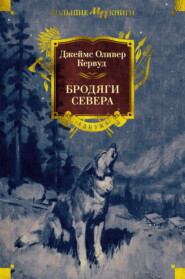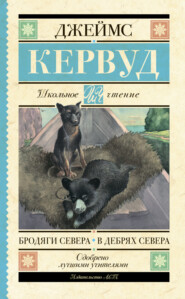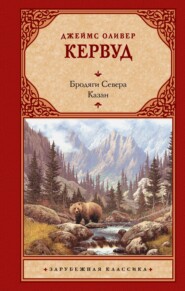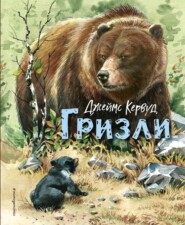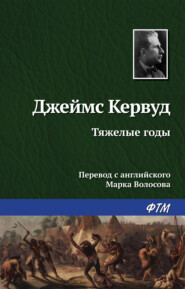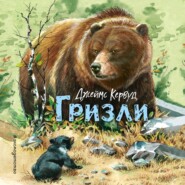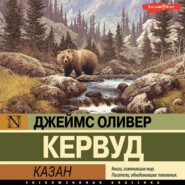По всем вопросам обращайтесь на: info@litportal.ru
(©) 2003-2024.
✖
The Country Beyond: A Romance of the Wilderness
Автор
Год написания книги
2017
Настройки чтения
Размер шрифта
Высота строк
Поля
The Country Beyond: A Romance of the Wilderness
James Curwood
James Oliver Curwood
The Country Beyond: A Romance of the Wilderness
CHAPTER I
Not far from the rugged and storm-whipped north shore of Lake Superior, and south of the Kaministiqua, yet not as far south as the Rainy River waterway, there lay a paradise lost in the heart of a wilderness world – and in that paradise "a little corner of hell."
That was what the girl had called it once upon a time, when sobbing out the shame and the agony of it to herself. That was before Peter had come to leaven the drab of her life. But the hell was still there.
One would not have guessed its existence, standing at the bald top of Cragg's Ridge this wonderful thirtieth day of May. In the whiteness of winter one could look off over a hundred square miles of freezing forest and swamp and river country, with the gleam of ice-covered lakes here and there, fringed by their black spruce and cedar and balsam – a country of storm, of deep snows, and men and women whose blood ran red with the thrill that the hardship and the never-ending adventure of the wild.
But this was spring. And such a spring as had not come to the Canadian north country in many years. Until three days ago there had been a deluge of warm rains, and since then the sun had inundated the land with the golden warmth of summer. The last chill was gone from the air, and the last bit of frozen earth and muck from the deepest and blackest swamps, North, south, east and west the wilderness world was a glory of bursting life, of springtime mellowing into summer. Ridge upon ridge of yellows and greens and blacks swept away into the unknown distances like the billows of a vast sea; and between them lay the valleys and swamps, the lakes and waterways, glad with the rippling song of running waters, the sweet scents of early flowering time, and the joyous voice of all mating creatures.
Just under Cragg's Ridge lay the paradise, a meadow-like sweep of plain that reached down to the edge of Clearwater Lake, with clumps of poplars and white birch and darker tapestries of spruce and balsams dotting it like islets in a sea of verdant green. The flowers were two weeks ahead of their time and the sweet perfumes of late June, instead of May, rose up out of the plain, and already there was nesting in the velvety splashes of timber.
In the edge of a clump of this timber, flat on his belly, lay Peter. The love of adventure was in him, and today he had sallied forth on his most desperate enterprise. For the first time he had gone alone to the edge of Clearwater Lake, half a mile away; boldly he had trotted up and down the white strip of beach where the girl's footprints still remained in the sand, and defiantly he had yipped at the shimmering vastness of the water, and at the white gulls circling near him in quest of dead fish flung ashore. Peter was three months old. Yesterday he had been a timid pup, shrinking from the bigness and strangeness of everything about him; but today he had braved the lake trail on his own nerve, and nothing had dared to come near him in spite of his yipping, so that a great courage and a great desire were born in him.
Therefore, in returning, he had paused in the edge of a great clump of balsams and spruce, and lay flat on his belly, his sharp little eyes leveled yearningly at the black mystery of its deeper shadows. The bit of forest filled a cup-like depression in the plain, and was possibly half a rifle-shot distance from end to end – but to Peter it was as vast as life itself. And something urged him to go in.
And as he lay there, desire and indecision struggling for mastery within him, no power could have told Peter that destinies greater than his own were working through the soul of the dog that was in him, and that on his decision to go in or not to go in – on the triumph of courage or cowardice – there rested the fates of lives greater than his own, of men, and women, and of little children still unborn. A glass of wine once lost a kingdom, a nail turned the tide of a mighty battle, and a woman's smile once upon a time destroyed the homes of a million people. Thus have trivial things played their potent parts in the history of human lives, yet these things Peter did not know – nor that his greatest hour had come.
At last he rose from his squatting posture, and stood upon his feet. He was not a beautiful pup, this Peter Pied-Bot– or Peter Club-foot, as Jolly Roger McKay – who lived over in the big cedar swamp – had named him when he gave Peter to the girl. He was, in a way, an accident and a homely one at that. His father was a blue-blooded fighting Airedale who had broken from his kennel long enough to commit a mesalliance with a huge big footed and peace-loving Mackenzie hound – and Peter was the result. He wore the fiercely bristling whiskers of his Airedale father at the age of three months; his ears were flappy and big, his tail was knotted, and his legs were ungainly and loose, with huge feet at the end of them – so big and heavy that he stumbled frequently, and fell on his nose. One pitied him at first – and then loved him. For Peter, in spite of his homeliness, had the two best bloods of all dog creation in his veins. Yet in a way it was like mixing nitro-glycerin with olive oil, or dynamite and saltpeter with milk and honey.
Peter's heart was thumping rapidly as he took a step toward the deeper shadows. He swallowed hard, as if to clear a knot out of his scrawny throat. But he had made up his mind. Something was compelling him, and he would go in. Slowly the gloom engulfed him, and once again the whimsical spirit of fatalism had chosen a trivial thing to work out its ends in the romance and tragedy of human lives.
Grim shadows began to surround Peter, and his ears shot up, and a scraggly brush stood out along his spine. But he did not bark, as he had barked along the shore of the lake, and in the green opens. Twice he looked back to the shimmer of sunshine that was growing more and more indistinct. As long as he could see this, and knew that his retreat was open, there still remained a bit of that courage which was swiftly ebbing in the thickening darkness. But the third time he looked back the light of the sun was utterly gone! For an instant the knot rose up in his throat and choked him, and his eyes popped, and grew like little balls of fire in his intense desire to see through the gloom. Even the girl, who was afraid of only one thing in the world, would have paused where Peter stood, with a little quickening of her heart. For all the light of the day, it seemed to Peter, had suddenly died out. Over his head the spruce and cedar and balsam tops grew so thick they were like a canopy of night. Through them the snow never came in winter, and under them the light of a blazing sun was only a ghostly twilight.
And now, as he stood there, his whole soul burning with a desire to see his way out, Peter began to hear strange sounds. Strangest of all, and most fearsome, was a hissing that came and went, sometimes very near to him, and always accompanied by a grating noise that curdled his blood. Twice after that he saw the shadow of the great owl as it swooped over him, and he flattened himself down, the knot in his throat growing bigger and more choking. And then he heard the soft and uncanny movement of huge feathered bodies in the thick shroud of boughs overhead, and slowly and cautiously he wormed himself around, determined to get back to sunshine and day as quickly as he could. It was not until he had made this movement that the real chill of horror gripped at his heart. Straight behind him, directly in the path he had traveled, he saw two little green balls of flame!
It was instinct, and not reason or experience, which told Peter there was menace and peril in these two tiny spots blazing in the gloom. He did not know that his own eyes, popping half out of his head, were equally terrifying in that pit of silence, nor that from him emanated a still more terrifying thing – the scent of dog. He trembled on his wobbly legs as the green eyes stared at him, and his back seemed to break in the middle, so that he sank helplessly down upon the soft spruce needles, waiting for his doom. In another flash the twin balls of green fire were gone. In a moment they appeared again, a little farther away. Then a second time they were gone, and a third time they flashed back at him – so distant they appeared like needle-points in the darkness. Something stupendous rose up in Peter. It was the soul of his Airedale father, telling him the other thing was running away! And in the joy of triumph Peter let out a yelp. In that night-infested place, alive with hiding things, the yelp set loose weird rustlings in the tangled treetops, strange murmurings of chortling voices, and the nasty snapping of beaks that held in them the power to rend Peter's skinny body into a hundred bits. From deeper in the thicket came the sudden crash of a heavy body, and with it the chuckling notes of a porcupine, and a hoo-hoo-hoo-ee of startled inquiry that at first Peter took for a human voice. And again he lay shivering close to the foot-deep carpet of needles under him, while his heart thumped against his ribs, and his whiskers stood out in mortal fear. There followed a weird and appalling silence, and in that stillness Peter quested vainly for the sunlight he had lost. And then, indistinctly, but bringing with it a new thrill, he heard another sound. It was a soft and distant rippling of running water. He knew that sound. It was friendly. He had played among the rocks and pebbles and sand where it was made. His courage came back, and he rose up on his legs, and made his way toward it. Something inside him told him to go quietly, but his feet were big and clumsy, and half a dozen times in the next two minutes he stumbled on his nose. At last he came to the stream, scarcely wider than a man might have reached across, rippling and plashing its way through the naked roots of trees. And ahead of him Peter saw light. He quickened his pace, until at the last he was running when he came out into the edge of the meadowy plain, with its sweetness of flowers and green grass and song of birds, and its glory of blue sky and sun.
If he had ever been afraid, Peter forgot it now. The choking went out of his throat, his heart fell back in its place, and the fierce conviction that he had vanquished everything in the world possessed him. He peered back into the dark cavern of evergreen out of which the streamlet gurgled, and then trotted straight away from it, growling back his defiance as he ran. At a safe distance he stopped, and faced about. Nothing was following him, and the importance of his achievements grew upon him. He began to swell; his fore-legs he planted pugnaciously, he hollowed his back, and began to bark with all the puppyish ferocity that was in him. And though he continued to yelp, and pounded the earth with his paws, and tore up the green grass with his sharp little teeth, nothing dared to come out of the black forest in answer to his challenge!
His head was high and his ears cocked jauntily as he trotted up the slope, and for the first time in his three months of existence he yearned to give battle to something that was alive. He was a changed Peter, no longer satisfied with the thought of gnawing sticks or stones or mauling a rabbit skin. At the crest of the slope he stopped, and yelped down, almost determined to go back to that black patch of forest and chase out everything that was in it. Then he turned toward Cragg's Ridge, and what he saw seemed slowly to shrink up the pugnaciousness that was in him, and his stiffened tail drooped until the knotty end of it touched the ground.
Three or four hundred yards away, out of the heart of that cup-like paradise which ran back through a break in the ridge, rose a spiral of white smoke, and with the sight of that smoke Peter heard also the chopping of axe. It made him shiver, and yet he made his way toward it. He was not old enough – nor was it in the gentle blood of his Mackenzie mother – to know the meaning of hate; but something was growing swiftly in Peter's shrewd little head, and he sensed impending danger whenever he heard the sound of the axe. For always there was associated with that sound the cat-like, thin-faced man with the red bristle on his upper lip, and the one eye that never opened but was always closed. And Peter had come to fear this one eyed man more than he feared any of the ghostly monsters hidden in the black pit of the forest he had braved that day.
But the owls, and the porcupine, and the fiery-eyed fox that had run away from him, had put into Peter something which was not in him yesterday, and he did not slink on his belly when he came to the edge of the cup between the broken ridge, but stood up boldly on his crooked legs and looked ahead of him. At the far edge of the cup, under the western shoulder of the ridge, was a thick scattering of tall cedars and green poplars and white birch, and in the shelter of these was a cabin built of logs. A lovelier spot could not have been chosen for the home of man. The hollow, from where Peter stood, was a velvety carpet of green, thickly strewn with flowers and ferns, sweet with the scent of violets and wild honey-suckle, and filled with the song of birds. Through the middle of it purled a tiny creek which disappeared between the ragged shoulders of rock, and close to this creek stood the cabin, its log walls smothered under a luxuriant growth of wood-vine. But Peter's quizzical little eyes were not measuring the beauty of the place, nor were his ears listening to the singing of birds, or the chattering of a red-squirrel on a stub a few yards away. He was looking beyond the cabin, to a chalk-white mass of rock that rose like a giant mushroom in the edge of the trees – and he was listening to the ringing of the axe, and straining his ears to catch the sound of a voice.
It was the voice he wanted most of all, and when this did not come he choked back a whimper in his throat, and went down to the creek, and waded through it, and came up cautiously behind the cabin, his eyes and ears alert and his loosely jointed legs ready for flight at a sign of danger. He wanted to set up his sharp yipping signal for the girl, but the menace of the axe choked back his desire. At the very end of the cabin, where the wood-vine grew thick and dense, Peter had burrowed himself a hiding-place, and into this he skulked with the quickness of a rat getting away from its enemies. From this protecting screen he cautiously poked forth his whiskered face, to make what inventory he could of his chances for supper and a safe home-coming.
And as he looked forth his heart gave a sudden jump.
It was the girl, and not the man who was using the axe today. At the big wood-pile half a stone's throw away he saw the shimmer of her brown curls in the sun, and a glimpse of her white face as it was turned for an instant toward the cabin. In his gladness he would have leaped out, but the curse of a voice he had learned to dread held him back.
A man had come out of the cabin, and close behind the man, a woman. The man was a long, lean, cadaverous-faced creature, and Peter knew that the devil was in him as he stood there at the cabin door. His breath, if one had stood close enough to smell it, was heavy with whiskey. Tobacco juice stained the corners of his mouth, and his one eye gleamed with an animal-like exultation as he nodded toward the girl with the shining curls
"Mooney says he'll pay seven-fifty for her when he gets his tie-money from the Government, an' he paid me fifty down," he said. "It'll help pay for the brat's board these last ten years – an' mebby, when it comes to a show-down, I can stick him for a thousand."
The woman made no answer. She was, in a way, past answering with a mind of her own. The man, as he stood there, was wicked and cruel, every line in his ugly face and angular body a line of sin. The woman was bent, broken, a wreck. In her face there was no sign of a living soul. Her eyes were dull, her heart burned out, her hands gnarled with toil under the slavedom of a beast. Yet even Peter, quiet as a mouse where he lay, sensed the difference between them. He had seen the girl and this woman sobbing in each other's arms. And often he had crawled to the woman's feet, and occasionally her hand had touched him, and frequently she had given him things to eat. But it was seldom he heard her voice when the man was near.
The man was biting off a chunk of black tobacco. Suddenly he asked,
"How old is she, Liz?"
And the woman answered in a strange and husky voice.
"Seventeen the twelfth day of this month."
The man spat.
"Mooney ought to pay a thousand. We've had her better'n ten years – an' Mooney's crazy as a loon to git her. He'll pay!"
"Jed – " The woman's voice rose above its hoarseness. "Jed – it ain't right!"
The man laughed. He opened his mouth wide, until his yellow fangs gleamed in the sun, and the girl with the axe paused for a moment in her work, and flung back her head, staring at the two before the cabin door.
"Right?" jeered the man. "Right? That's what you been preachin' me these last ten years 'bout whiskey-runnin,' but it ain't made me stop sellin' whiskey, has it? An' I guess it ain't a word that'll come between Mooney and me – not if Mooney gits his thousand." Suddenly he turned upon her, a hand half raised to strike. "An' if you whisper a word to her – if y' double-cross me so much as the length of your little finger – I'll break every bone in your body, so help me God! You understand? You won't say anything to her?"
The woman's uneven shoulders drooped lower.
"I won't say ennything, Jed. I – promise."
The man dropped his uplifted hand with a harsh grunt.
"I'll kill y' if you do," he warned.
The girl had dropped her axe, and was coming toward them. She was a slim, bird-like creature, with a poise to her head and an up-tilt to her chin which warned that the man had not yet beaten her to the level of the woman. She was dressed in a faded calico, frayed at the bottom, and with the sleeves bobbed off just above the elbows of her slim white arms. Her stockings were mottled with patches and mends, and her shoes were old, and worn out at the toes.
But to Peter, worshipping her from his hiding place, she was the most beautiful thing in the world. Jolly Roger had said the same thing, and most men – and women, too – would have agreed that this slip of a girl possessed a beauty which it would take a long time for unhappiness and torture to crush entirely out of her. Her eyes were as blue as the violets Peter had thrust his nose among that day. And her hair was a glory, loosed by her exertion from its bondage of faded ribbon, and falling about her shoulders and nearly to her waist in a mass of curling brown tresses that at times had made even Jed Hawkins' one eye light of with admiration. And yet, even in those times, he hated her, and more than once his bony fingers had closed viciously in that mass of radiant hair, but seldom could he wring a scream of pain from Nada. Even now, when she could see the light of the devil in his one gleaming eye, it was only her flesh – and not her soul – that was afraid.
But the strain had begun to show its mark. In the blue of her eyes was the look of one who was never free of haunting visions, her cheeks were pallid, and a little too thin, and the vivid redness of her lips was not of health and happiness, but a touch of the color which should have been in her face, and which until now had refused to die.
She faced the man, a little out of the reach of his arm.
"I told you never again to raise your hand to strike her," she cried in a fierce, suppressed little voice, her blue eyes flaming loathing and hatred at him. "If you hit her once more – something is going to happen. If you want to hit anyone, hit me. I kin stand it. But – look at her! You've broken her shoulder, you've crippled her – an' you oughta die!"
The man advanced half a step, his eye ablaze. Deep down in him Peter felt something he had never felt before. For the first time in his life he had no desire to run away from the man. Something rose up from his bony little chest, and grew in his throat, until it was a babyish snarl so low that no human ears could hear it. And in his hiding-place his needle-like fangs gleamed under snarling lips.
But the man did not strike, nor did he reach out to grip his fingers in the silken mass of Nada's hair. He laughed, as if something was choking him, and turned away with a toss of his arms.
"You ain't seein' me hit her any more, are you, Nady?" he said, and disappeared around the end of the cabin.
The girl laid a hand on the woman's arm. Her eyes softened, but she was trembling.
"I've told him what'll happen, an' he won't dare hit you any more," she comforted. "If he does, I'll end him. I will! I'll bring the police. I'll show 'em the places where he hides his whiskey. I'll – I'll put him in jail, if I die for it!"
James Curwood
James Oliver Curwood
The Country Beyond: A Romance of the Wilderness
CHAPTER I
Not far from the rugged and storm-whipped north shore of Lake Superior, and south of the Kaministiqua, yet not as far south as the Rainy River waterway, there lay a paradise lost in the heart of a wilderness world – and in that paradise "a little corner of hell."
That was what the girl had called it once upon a time, when sobbing out the shame and the agony of it to herself. That was before Peter had come to leaven the drab of her life. But the hell was still there.
One would not have guessed its existence, standing at the bald top of Cragg's Ridge this wonderful thirtieth day of May. In the whiteness of winter one could look off over a hundred square miles of freezing forest and swamp and river country, with the gleam of ice-covered lakes here and there, fringed by their black spruce and cedar and balsam – a country of storm, of deep snows, and men and women whose blood ran red with the thrill that the hardship and the never-ending adventure of the wild.
But this was spring. And such a spring as had not come to the Canadian north country in many years. Until three days ago there had been a deluge of warm rains, and since then the sun had inundated the land with the golden warmth of summer. The last chill was gone from the air, and the last bit of frozen earth and muck from the deepest and blackest swamps, North, south, east and west the wilderness world was a glory of bursting life, of springtime mellowing into summer. Ridge upon ridge of yellows and greens and blacks swept away into the unknown distances like the billows of a vast sea; and between them lay the valleys and swamps, the lakes and waterways, glad with the rippling song of running waters, the sweet scents of early flowering time, and the joyous voice of all mating creatures.
Just under Cragg's Ridge lay the paradise, a meadow-like sweep of plain that reached down to the edge of Clearwater Lake, with clumps of poplars and white birch and darker tapestries of spruce and balsams dotting it like islets in a sea of verdant green. The flowers were two weeks ahead of their time and the sweet perfumes of late June, instead of May, rose up out of the plain, and already there was nesting in the velvety splashes of timber.
In the edge of a clump of this timber, flat on his belly, lay Peter. The love of adventure was in him, and today he had sallied forth on his most desperate enterprise. For the first time he had gone alone to the edge of Clearwater Lake, half a mile away; boldly he had trotted up and down the white strip of beach where the girl's footprints still remained in the sand, and defiantly he had yipped at the shimmering vastness of the water, and at the white gulls circling near him in quest of dead fish flung ashore. Peter was three months old. Yesterday he had been a timid pup, shrinking from the bigness and strangeness of everything about him; but today he had braved the lake trail on his own nerve, and nothing had dared to come near him in spite of his yipping, so that a great courage and a great desire were born in him.
Therefore, in returning, he had paused in the edge of a great clump of balsams and spruce, and lay flat on his belly, his sharp little eyes leveled yearningly at the black mystery of its deeper shadows. The bit of forest filled a cup-like depression in the plain, and was possibly half a rifle-shot distance from end to end – but to Peter it was as vast as life itself. And something urged him to go in.
And as he lay there, desire and indecision struggling for mastery within him, no power could have told Peter that destinies greater than his own were working through the soul of the dog that was in him, and that on his decision to go in or not to go in – on the triumph of courage or cowardice – there rested the fates of lives greater than his own, of men, and women, and of little children still unborn. A glass of wine once lost a kingdom, a nail turned the tide of a mighty battle, and a woman's smile once upon a time destroyed the homes of a million people. Thus have trivial things played their potent parts in the history of human lives, yet these things Peter did not know – nor that his greatest hour had come.
At last he rose from his squatting posture, and stood upon his feet. He was not a beautiful pup, this Peter Pied-Bot– or Peter Club-foot, as Jolly Roger McKay – who lived over in the big cedar swamp – had named him when he gave Peter to the girl. He was, in a way, an accident and a homely one at that. His father was a blue-blooded fighting Airedale who had broken from his kennel long enough to commit a mesalliance with a huge big footed and peace-loving Mackenzie hound – and Peter was the result. He wore the fiercely bristling whiskers of his Airedale father at the age of three months; his ears were flappy and big, his tail was knotted, and his legs were ungainly and loose, with huge feet at the end of them – so big and heavy that he stumbled frequently, and fell on his nose. One pitied him at first – and then loved him. For Peter, in spite of his homeliness, had the two best bloods of all dog creation in his veins. Yet in a way it was like mixing nitro-glycerin with olive oil, or dynamite and saltpeter with milk and honey.
Peter's heart was thumping rapidly as he took a step toward the deeper shadows. He swallowed hard, as if to clear a knot out of his scrawny throat. But he had made up his mind. Something was compelling him, and he would go in. Slowly the gloom engulfed him, and once again the whimsical spirit of fatalism had chosen a trivial thing to work out its ends in the romance and tragedy of human lives.
Grim shadows began to surround Peter, and his ears shot up, and a scraggly brush stood out along his spine. But he did not bark, as he had barked along the shore of the lake, and in the green opens. Twice he looked back to the shimmer of sunshine that was growing more and more indistinct. As long as he could see this, and knew that his retreat was open, there still remained a bit of that courage which was swiftly ebbing in the thickening darkness. But the third time he looked back the light of the sun was utterly gone! For an instant the knot rose up in his throat and choked him, and his eyes popped, and grew like little balls of fire in his intense desire to see through the gloom. Even the girl, who was afraid of only one thing in the world, would have paused where Peter stood, with a little quickening of her heart. For all the light of the day, it seemed to Peter, had suddenly died out. Over his head the spruce and cedar and balsam tops grew so thick they were like a canopy of night. Through them the snow never came in winter, and under them the light of a blazing sun was only a ghostly twilight.
And now, as he stood there, his whole soul burning with a desire to see his way out, Peter began to hear strange sounds. Strangest of all, and most fearsome, was a hissing that came and went, sometimes very near to him, and always accompanied by a grating noise that curdled his blood. Twice after that he saw the shadow of the great owl as it swooped over him, and he flattened himself down, the knot in his throat growing bigger and more choking. And then he heard the soft and uncanny movement of huge feathered bodies in the thick shroud of boughs overhead, and slowly and cautiously he wormed himself around, determined to get back to sunshine and day as quickly as he could. It was not until he had made this movement that the real chill of horror gripped at his heart. Straight behind him, directly in the path he had traveled, he saw two little green balls of flame!
It was instinct, and not reason or experience, which told Peter there was menace and peril in these two tiny spots blazing in the gloom. He did not know that his own eyes, popping half out of his head, were equally terrifying in that pit of silence, nor that from him emanated a still more terrifying thing – the scent of dog. He trembled on his wobbly legs as the green eyes stared at him, and his back seemed to break in the middle, so that he sank helplessly down upon the soft spruce needles, waiting for his doom. In another flash the twin balls of green fire were gone. In a moment they appeared again, a little farther away. Then a second time they were gone, and a third time they flashed back at him – so distant they appeared like needle-points in the darkness. Something stupendous rose up in Peter. It was the soul of his Airedale father, telling him the other thing was running away! And in the joy of triumph Peter let out a yelp. In that night-infested place, alive with hiding things, the yelp set loose weird rustlings in the tangled treetops, strange murmurings of chortling voices, and the nasty snapping of beaks that held in them the power to rend Peter's skinny body into a hundred bits. From deeper in the thicket came the sudden crash of a heavy body, and with it the chuckling notes of a porcupine, and a hoo-hoo-hoo-ee of startled inquiry that at first Peter took for a human voice. And again he lay shivering close to the foot-deep carpet of needles under him, while his heart thumped against his ribs, and his whiskers stood out in mortal fear. There followed a weird and appalling silence, and in that stillness Peter quested vainly for the sunlight he had lost. And then, indistinctly, but bringing with it a new thrill, he heard another sound. It was a soft and distant rippling of running water. He knew that sound. It was friendly. He had played among the rocks and pebbles and sand where it was made. His courage came back, and he rose up on his legs, and made his way toward it. Something inside him told him to go quietly, but his feet were big and clumsy, and half a dozen times in the next two minutes he stumbled on his nose. At last he came to the stream, scarcely wider than a man might have reached across, rippling and plashing its way through the naked roots of trees. And ahead of him Peter saw light. He quickened his pace, until at the last he was running when he came out into the edge of the meadowy plain, with its sweetness of flowers and green grass and song of birds, and its glory of blue sky and sun.
If he had ever been afraid, Peter forgot it now. The choking went out of his throat, his heart fell back in its place, and the fierce conviction that he had vanquished everything in the world possessed him. He peered back into the dark cavern of evergreen out of which the streamlet gurgled, and then trotted straight away from it, growling back his defiance as he ran. At a safe distance he stopped, and faced about. Nothing was following him, and the importance of his achievements grew upon him. He began to swell; his fore-legs he planted pugnaciously, he hollowed his back, and began to bark with all the puppyish ferocity that was in him. And though he continued to yelp, and pounded the earth with his paws, and tore up the green grass with his sharp little teeth, nothing dared to come out of the black forest in answer to his challenge!
His head was high and his ears cocked jauntily as he trotted up the slope, and for the first time in his three months of existence he yearned to give battle to something that was alive. He was a changed Peter, no longer satisfied with the thought of gnawing sticks or stones or mauling a rabbit skin. At the crest of the slope he stopped, and yelped down, almost determined to go back to that black patch of forest and chase out everything that was in it. Then he turned toward Cragg's Ridge, and what he saw seemed slowly to shrink up the pugnaciousness that was in him, and his stiffened tail drooped until the knotty end of it touched the ground.
Three or four hundred yards away, out of the heart of that cup-like paradise which ran back through a break in the ridge, rose a spiral of white smoke, and with the sight of that smoke Peter heard also the chopping of axe. It made him shiver, and yet he made his way toward it. He was not old enough – nor was it in the gentle blood of his Mackenzie mother – to know the meaning of hate; but something was growing swiftly in Peter's shrewd little head, and he sensed impending danger whenever he heard the sound of the axe. For always there was associated with that sound the cat-like, thin-faced man with the red bristle on his upper lip, and the one eye that never opened but was always closed. And Peter had come to fear this one eyed man more than he feared any of the ghostly monsters hidden in the black pit of the forest he had braved that day.
But the owls, and the porcupine, and the fiery-eyed fox that had run away from him, had put into Peter something which was not in him yesterday, and he did not slink on his belly when he came to the edge of the cup between the broken ridge, but stood up boldly on his crooked legs and looked ahead of him. At the far edge of the cup, under the western shoulder of the ridge, was a thick scattering of tall cedars and green poplars and white birch, and in the shelter of these was a cabin built of logs. A lovelier spot could not have been chosen for the home of man. The hollow, from where Peter stood, was a velvety carpet of green, thickly strewn with flowers and ferns, sweet with the scent of violets and wild honey-suckle, and filled with the song of birds. Through the middle of it purled a tiny creek which disappeared between the ragged shoulders of rock, and close to this creek stood the cabin, its log walls smothered under a luxuriant growth of wood-vine. But Peter's quizzical little eyes were not measuring the beauty of the place, nor were his ears listening to the singing of birds, or the chattering of a red-squirrel on a stub a few yards away. He was looking beyond the cabin, to a chalk-white mass of rock that rose like a giant mushroom in the edge of the trees – and he was listening to the ringing of the axe, and straining his ears to catch the sound of a voice.
It was the voice he wanted most of all, and when this did not come he choked back a whimper in his throat, and went down to the creek, and waded through it, and came up cautiously behind the cabin, his eyes and ears alert and his loosely jointed legs ready for flight at a sign of danger. He wanted to set up his sharp yipping signal for the girl, but the menace of the axe choked back his desire. At the very end of the cabin, where the wood-vine grew thick and dense, Peter had burrowed himself a hiding-place, and into this he skulked with the quickness of a rat getting away from its enemies. From this protecting screen he cautiously poked forth his whiskered face, to make what inventory he could of his chances for supper and a safe home-coming.
And as he looked forth his heart gave a sudden jump.
It was the girl, and not the man who was using the axe today. At the big wood-pile half a stone's throw away he saw the shimmer of her brown curls in the sun, and a glimpse of her white face as it was turned for an instant toward the cabin. In his gladness he would have leaped out, but the curse of a voice he had learned to dread held him back.
A man had come out of the cabin, and close behind the man, a woman. The man was a long, lean, cadaverous-faced creature, and Peter knew that the devil was in him as he stood there at the cabin door. His breath, if one had stood close enough to smell it, was heavy with whiskey. Tobacco juice stained the corners of his mouth, and his one eye gleamed with an animal-like exultation as he nodded toward the girl with the shining curls
"Mooney says he'll pay seven-fifty for her when he gets his tie-money from the Government, an' he paid me fifty down," he said. "It'll help pay for the brat's board these last ten years – an' mebby, when it comes to a show-down, I can stick him for a thousand."
The woman made no answer. She was, in a way, past answering with a mind of her own. The man, as he stood there, was wicked and cruel, every line in his ugly face and angular body a line of sin. The woman was bent, broken, a wreck. In her face there was no sign of a living soul. Her eyes were dull, her heart burned out, her hands gnarled with toil under the slavedom of a beast. Yet even Peter, quiet as a mouse where he lay, sensed the difference between them. He had seen the girl and this woman sobbing in each other's arms. And often he had crawled to the woman's feet, and occasionally her hand had touched him, and frequently she had given him things to eat. But it was seldom he heard her voice when the man was near.
The man was biting off a chunk of black tobacco. Suddenly he asked,
"How old is she, Liz?"
And the woman answered in a strange and husky voice.
"Seventeen the twelfth day of this month."
The man spat.
"Mooney ought to pay a thousand. We've had her better'n ten years – an' Mooney's crazy as a loon to git her. He'll pay!"
"Jed – " The woman's voice rose above its hoarseness. "Jed – it ain't right!"
The man laughed. He opened his mouth wide, until his yellow fangs gleamed in the sun, and the girl with the axe paused for a moment in her work, and flung back her head, staring at the two before the cabin door.
"Right?" jeered the man. "Right? That's what you been preachin' me these last ten years 'bout whiskey-runnin,' but it ain't made me stop sellin' whiskey, has it? An' I guess it ain't a word that'll come between Mooney and me – not if Mooney gits his thousand." Suddenly he turned upon her, a hand half raised to strike. "An' if you whisper a word to her – if y' double-cross me so much as the length of your little finger – I'll break every bone in your body, so help me God! You understand? You won't say anything to her?"
The woman's uneven shoulders drooped lower.
"I won't say ennything, Jed. I – promise."
The man dropped his uplifted hand with a harsh grunt.
"I'll kill y' if you do," he warned.
The girl had dropped her axe, and was coming toward them. She was a slim, bird-like creature, with a poise to her head and an up-tilt to her chin which warned that the man had not yet beaten her to the level of the woman. She was dressed in a faded calico, frayed at the bottom, and with the sleeves bobbed off just above the elbows of her slim white arms. Her stockings were mottled with patches and mends, and her shoes were old, and worn out at the toes.
But to Peter, worshipping her from his hiding place, she was the most beautiful thing in the world. Jolly Roger had said the same thing, and most men – and women, too – would have agreed that this slip of a girl possessed a beauty which it would take a long time for unhappiness and torture to crush entirely out of her. Her eyes were as blue as the violets Peter had thrust his nose among that day. And her hair was a glory, loosed by her exertion from its bondage of faded ribbon, and falling about her shoulders and nearly to her waist in a mass of curling brown tresses that at times had made even Jed Hawkins' one eye light of with admiration. And yet, even in those times, he hated her, and more than once his bony fingers had closed viciously in that mass of radiant hair, but seldom could he wring a scream of pain from Nada. Even now, when she could see the light of the devil in his one gleaming eye, it was only her flesh – and not her soul – that was afraid.
But the strain had begun to show its mark. In the blue of her eyes was the look of one who was never free of haunting visions, her cheeks were pallid, and a little too thin, and the vivid redness of her lips was not of health and happiness, but a touch of the color which should have been in her face, and which until now had refused to die.
She faced the man, a little out of the reach of his arm.
"I told you never again to raise your hand to strike her," she cried in a fierce, suppressed little voice, her blue eyes flaming loathing and hatred at him. "If you hit her once more – something is going to happen. If you want to hit anyone, hit me. I kin stand it. But – look at her! You've broken her shoulder, you've crippled her – an' you oughta die!"
The man advanced half a step, his eye ablaze. Deep down in him Peter felt something he had never felt before. For the first time in his life he had no desire to run away from the man. Something rose up from his bony little chest, and grew in his throat, until it was a babyish snarl so low that no human ears could hear it. And in his hiding-place his needle-like fangs gleamed under snarling lips.
But the man did not strike, nor did he reach out to grip his fingers in the silken mass of Nada's hair. He laughed, as if something was choking him, and turned away with a toss of his arms.
"You ain't seein' me hit her any more, are you, Nady?" he said, and disappeared around the end of the cabin.
The girl laid a hand on the woman's arm. Her eyes softened, but she was trembling.
"I've told him what'll happen, an' he won't dare hit you any more," she comforted. "If he does, I'll end him. I will! I'll bring the police. I'll show 'em the places where he hides his whiskey. I'll – I'll put him in jail, if I die for it!"






